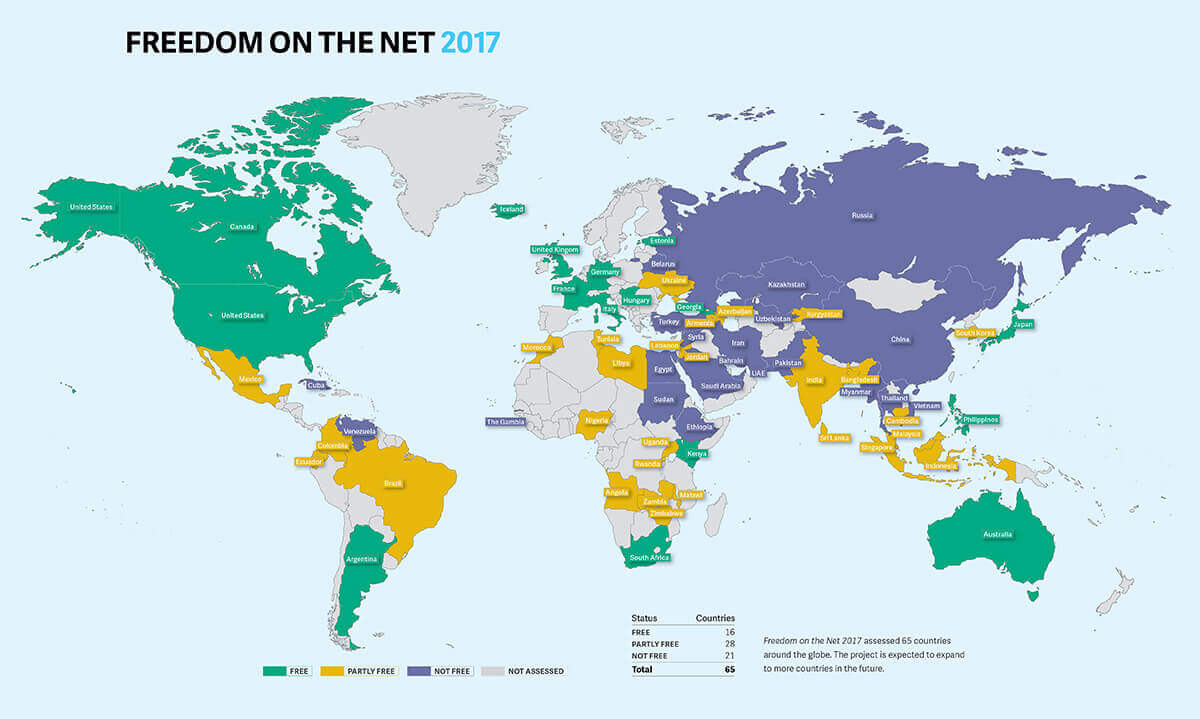Internet Freedom Declines for the 7th Year in a Row
Freedom House has released their Freedom on the Net 2017 report — and the conclusions aren’t great if you care about a free and open internet. This is the seventh consecutive report that found an overall decline in internet freedom worldwide, with 36 percent of the world living in countries that were rated “not free” and 28 percent living in countries rated “partly free.” Only 23 percent of the countries rated were found to be “free,” while the remaining 13 percent weren’t assessed. China was the least free country for the third year in the row.
Freedom House identified six major trends worldwide that contributed to the global decline in internet freedom.
Government manipulation of social media
While the spread of “fake news” and Russia’s involvement in the US election made a lot of news this past year, government manipulation of social media and online content reaches beyond Russia’s actions. Freedom House documented online manipulation and disinformation campaigns in “at least” 17 countries. Notably, most of the campaigns were aimed at the offending government’s own citizens, not at foreign governments.
More troubling, 30 countries were found to have employed people that they’re calling “opinion shapers.” The job of these workers is to boost government viewpoints and also band together to fight opposition online.
Freedom House points out that these types of campaigns aren’t new — China and Russia have been employing them for over a decade — but new technologies and more sophisticated algorithms make them more dangerous than ever before. The ability to create and activate bots, for example, makes both spreading government propaganda and pushing down dissent more cost effective than ever before. Additionally, the ability to seamlessly integrate fake news stories and other forms of content into real news makes government manipulation extremely difficult to detect and, Freedom House says, poses a real threat to democracy worldwide.
State attacks on mobile connectivity
Repressive governments worldwide have realized something Silicon Valley has been saying for years now: Mobile first. Specifically, Freedom House reports that half of all internet shutdowns this past year targeted mobile connectivity, while the majority of the rest targeted both mobile and fixed-line service. The shutdowns were linked both with political unrest — such as protests in Mexico — and areas with high populations of religious minorities — like Tibet, in China.
While the 2016 Freedom on the Net report found that 13 out of 65 countries had restrictions on mobile connectivity, the 2017 report documented 19 countries with mobile restrictions.
In many parts of the world, minority, repressed, and lower income people rely on mobile for internet access. Additionally, protests movements have relied heavily on mobile connectivity since the success of the Arab Spring. As a result,this spike in mobile connectivity targeting could result in further repression of already repressed peoples worldwide.
Governments restricting live video streaming
The widespread distribution of smartphones combined with software that makes live streaming easy and accessible has made it a favorite tool for protest and dissent — and also a target for repressive governments. Governments worldwide have been cracking down on live video, often with the excuse that live streaming can result in people broadcasting violent or sexually explicit images. Freedom House documented restrictions during political protests, for example, when protestors and journalists tried to live stream events in order to get out the word about anti-government sentiment or violent police responses.
Cyberattacks on the rise
Cyberattacks against both everyday citizens, national politicians, and activists increased over the past year. Freedom House cites both increased access to the technology needed to perpetrate these attacks and inadequate security on the behalf of the people targeted as two major reasons why these cyberattacks have become more common.
The types of attacks are also more varied than big headline-grabbers like the hack on the Democratic National Committee (DNC). Freedom House lists distributed denial of service (DDOS) attacks, disabling or hijacking the social media accounts of activists, and surveillance via illegal hacking of opposition politicians and human rights defenders. In some countries — including Bahrain, Azerbaijan, Mexico, and China — independent analysis has found that government was behind attacks.
Restrictions on VPNs
Virtual Private Networks (VPNs) became an increasingly popular target for repressive regimes worldwide this past year, with 14 countries restricting VPNs in some form and six countries introducing new restrictions. VPNs can be used for a range of reasons, including corporations giving their employees access to confidential information when they’re not in the office, but they’re also used by citizens of countries with restrictive regimes to access blocked or censored websites.
Notably, both China and Russia — two countries who are among the least free when it comes to internet access — have introduced VPN restrictions this past year.
Physical attacks on online activists and journalists
Finally, physical attacks in response to online activity saw a 50 percent increase worldwide this past year: In 2016, 20 countries had this type of attack, compared with 30 in the 2017 report. Writers who covered “sensitive topics” and those who criticized or mocked religious beliefs were targeted most and in eight countries, people were even murdered for things they posted online. In four of those eight — Brazil, Mexico, Pakistan, and Syria — murders based on online expression have happened three years in a row.
About the Freedom on the Net report
Freedom on the Net examines the state of internet freedom in 65 countries, which includes 88 percent of the internet users around the world. Most of the researchers involved are based in the country they’re studying. They examine internet laws and practices, test website accessibility, and interview people on the ground. This is the seventh report and it looks specifically at the time period between June 2016 and May 2017.
Share this postInstall Tenta Browser Free!
Start protecting your online privacy today with Tenta Browser.



